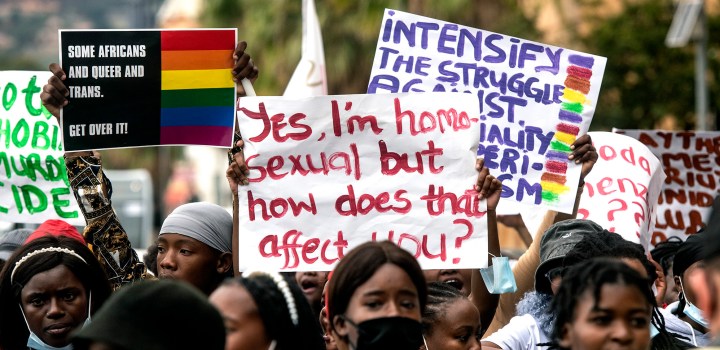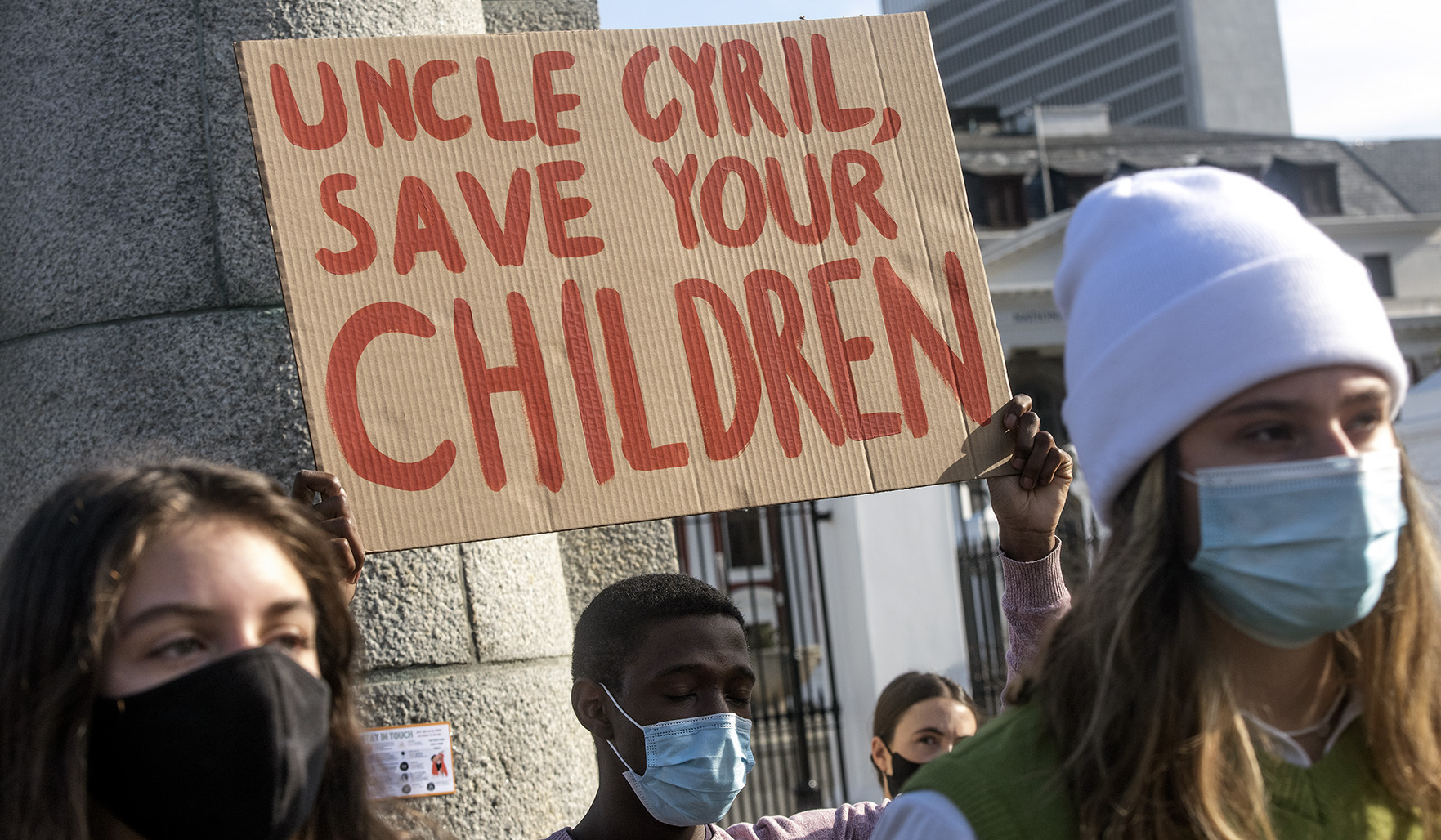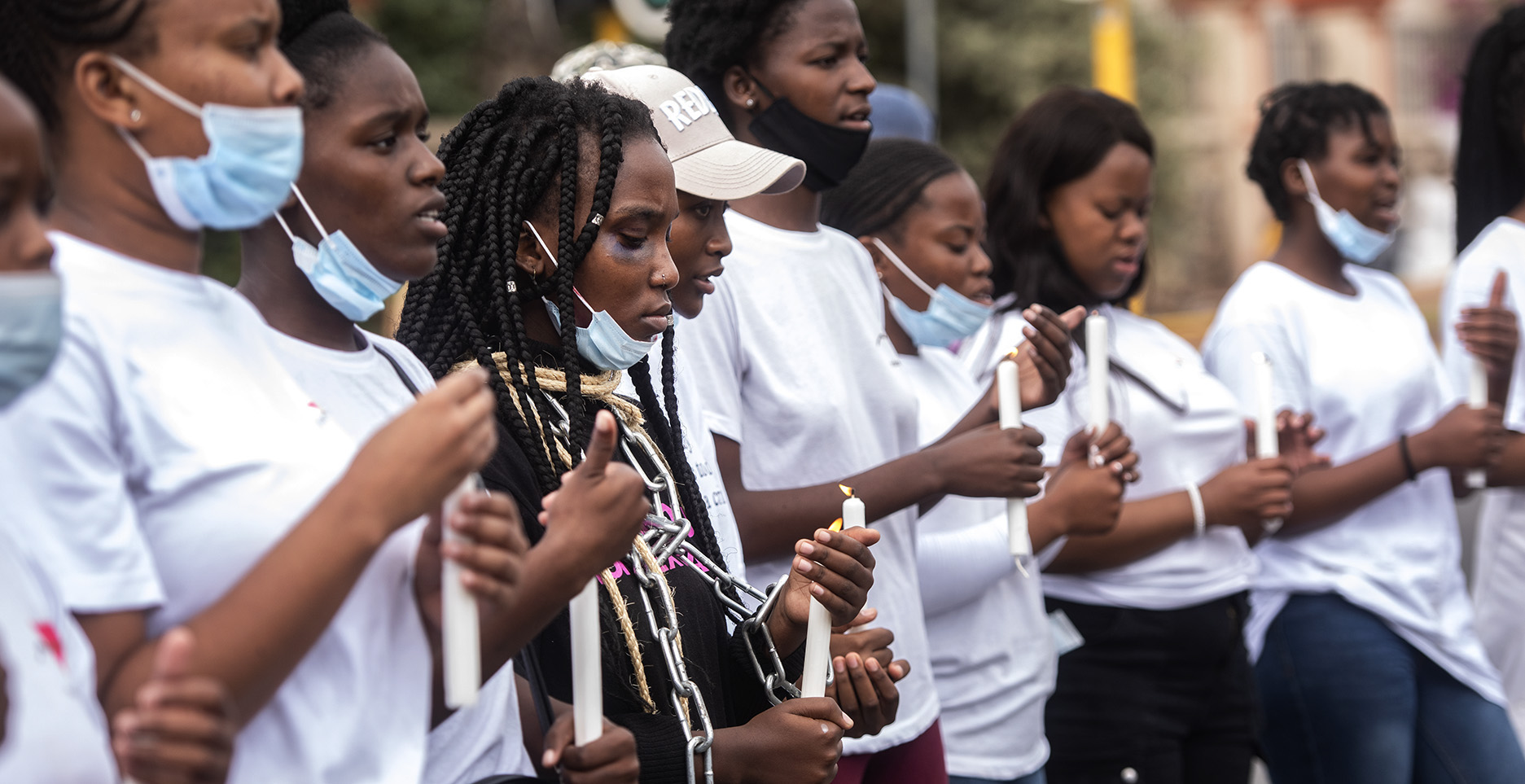MAVERICK CITIZEN OP-ED
Bodies pile up as the hate crimes bill gathers dust in Parliament

Although the Prevention and Combating of Hate Crimes and Hate Speech Bill was introduced to Parliament in April 2018 and revived in October 2019, it has been ignored by MPs. The Department of Justice and Parliament must act now to pass the bill into law in order to protect some of the most vulnerable members of our society, such as the LGBTQI+ community.

CAPE TOWN, SOUTH AFRICA – APRIL 24: Anti-Gender Based Violence movement protest outside Parliament during a peaceful protest on April 24, 2021 in Cape Town, South Africa. Gender Based Violence remains a societal problem in South Africa. (Photo by Gallo Images/Brenton Geach)
On 27 April 2021, South Africa celebrates Freedom Day, commemorating its first democratic elections held in 1994. Those elections marked a day of hope for South Africa – hope that we could, and would, do better when approaching “difference”, whether that difference was because of race, religion, sexual orientation or gender identity, or social origin, or any other so-called marker of difference that might have been perceived as something that divides us.
Twenty-one years later, the news dominating headlines in the first few weeks of Freedom Month 2021 have been about hate and hate crimes. The names of the three people listed below are just the most recent known cases in a long list:
- Sphamandla Khoza, a 24-year-old LGBTQI+ individual, brutally murdered in KwaZulu-Natal.
- Andile “Lulu” Nthulela, a 40-year-old LGBTQI+ individual, murdered in the Eastern Cape.
- Nathaniel “Spokgoane” Mbele, an LGBTQI+ individual stabbed to death in Gauteng.
The list shows how, for the last year and a half, there has been at least one hate-related incident every month – often resulting in the death of the individual targeted.

CAPE TOWN, SOUTH AFRICA – APRIL 26: Protesters with candles in memory of victims outside Parliament during the End Queer and Trans Hate Campaign on April 26, 2021 in Cape Town, South Africa. The march was in solidarity with the African LGBTQI+ victims and survivors of violence. (Photo by Gallo Images/Brenton Geach)
News headlines in March, which is commemorated as Human Rights Month, were no different, with attacks against foreign nationals making headlines.
On Friday, 16 April 2021, the Hate Crimes Working Group (HCWG) – a civil society group that advocates the enactment of comprehensive and costed hate crime legislation – sent a letter to Parliament, calling for answers about why there has been no movement on the Prevention and Combating of Hate Crimes and Hate Speech Bill. The current formulation of the bill was introduced to Parliament three years ago, in April 2018. Comments were called for, and many organisations and individuals submitted comments, including the HCWG.

CAPE TOWN, SOUTH AFRICA – APRIL 26: Emotional scenes outside Parliament during the End Queer and Trans Hate Campaign on April 26, 2021 in Cape Town, South Africa. The march was in solidarity with the African LGBTQI+ victims and survivors of violence. (Photo by Gallo Images/Brenton Geach)
In 2019, the year in which South Africa held a general election, the bill lapsed – along with others that had been before the fifth Parliament at the time. The next Parliament elected (the sixth Parliament) had to revive lapsed bills if it wanted to continue the process of passing those bills into law. The Prevention and Combating of Hate Crimes and Hate Speech Bill was revived in October 2019, but since then nothing has happened – hate crimes are clearly not a priority for the current Members of Parliament and elected officials.
In comparison, another bill also lapsed at the same time as the hate crimes bill – the Border Management Authority Bill. This one was swiftly revived by Parliament in October 2019. Portfolio committees met and discussed the bill multiple times in October and November that same year, and on 2 December 2019, it was passed by the National Council of Provinces. It was passed by both houses of Parliament on 3 March 2020, and signed into law by President Cyril Ramaphosa on 15 July 2020, with some sections delayed and only coming into effect on 1 January 2021.
Grave concerns about the Border Management Authority Act have been raised, comparing it to the establishment of a department similar to the USA’s Homeland Security. Professor Jane Duncan, head of the Department of Journalism, Film and Television at the University of Johannesburg, has placed the act among “racist, ethno-nationalist developments over citizenship around the world”. It is including South Africa, she said, on the “growing list of nasty little countries that have defined themselves recently according to who they can exclude, repress and marginalise”.
In February 2019, the National Action Plan to combat racism, racial discrimination, xenophobia and related intolerance was approved by Cabinet. It acknowledges that there is a Prevention and Combating of Hate Crimes and Hate Speech Bill, and further states: “Developing specific legislation on hate crimes will have a number of advantages. It will help create a shared definition of hate crime amongst all those involved in the criminal justice system; will send a clear message that hate crimes will not be tolerated in South Africa; will provide additional tools to investigators and prosecutors to hold perpetrators accountable; will provide means to monitor efforts and trends in addressing hate crimes; and will allow for effective coordination between government service providers to reduce the impact of secondary victimisation on hate crime victims.”
Despite this acknowledgement in the action plan, nothing further has been done by the Department of Justice, or Parliament, or indeed any other entity in government regarding the hate crimes bill. This is unacceptable.
On 16 July 2019 Minister of Justice Ronald Lamola stated: “The Department [of Justice] has a critical role in developing and sustaining our hard-earned democracy. […] In order to sustain our democracy, the department advances programmes that are geared at improving the lives of all citizens, upholding the rule of law, promoting equality and ensuring the advancement of human rights and freedoms. One of the efforts in this regard is the National Action Plan […] As part of its legislative programme, the department will promote the following this financial year: the revival of the Prevention and Combating of Hate Crimes and Hate Speech Bill.”
Reviving the bill before Parliament is quite simply not enough. It needs to be processed and passed into law, with budget allocation for its meaningful enactment and implementation. Failure to do so is a failure to protect some of the most vulnerable people in South Africa.
Despite both the minister’s statement on promoting the hate crimes bill, and the commitments and emphasis placed on it in the National Action Plan, the bill has not moved and has not been prioritised.

(Left) Portia Simphiwe Mtshweni. Kirvan Fortuin. Nare Mphela. (Photos: Wikipedia)
Remember these names:
These are just some of the individuals who have been victims of hate crimes since the Prevention and Combating of Hate Crimes and Hate Speech Bill was revived by Parliament. Each of them had dreams, aspirations and the right to feel safe in a country where their human dignity is protected. The hate crimes bill gathers dust in Parliament, as the bodies of victims pile up.
The urgency of the current moment is clear, and has been clear for some time. The Department of Justice, together with Parliament, must act now to pass the bill into law. Anything less than that is simply not good enough. DM/MC
Sally Gandar is the chairperson of the Hate Crimes Working Group.




















 Become an Insider
Become an Insider
Surely we have lots of real law which outlaws the behaviours leading to these killings/murders. Surely the real job is to actually train our police & civil service to treat everyone equally – regardless of how people self-define? Creating every sector of society as a victim is NOT the way; nihilist.
What incentive is there in parliament (more like whorehouse for some) when some (most identify as male) are perpetrators or promoters of hate parading as democracy? Example – think of the brigade in red overalls! In the judiciary they tell females to ‘shut up’ or sit in on appointment hearings!